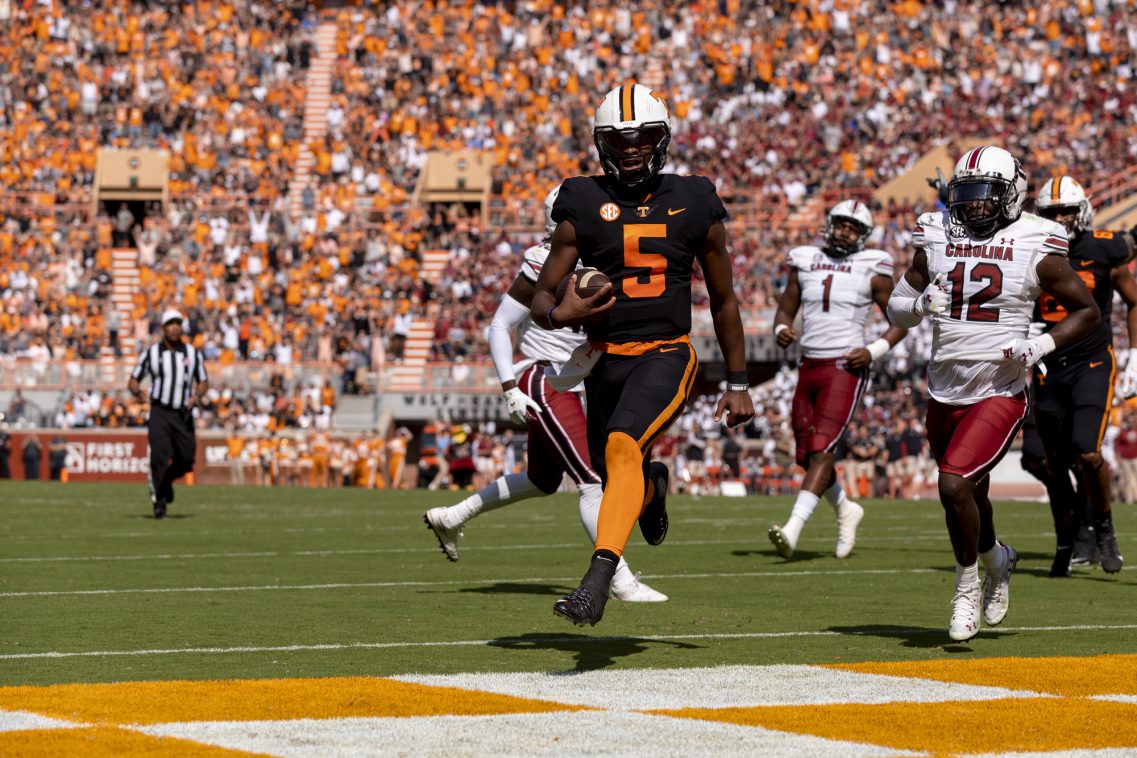Here’s one thing it feels like is happening to Tennessee more often than it actually is: the Vols get to third-and-short, go fast, and get stopped because defenses know what’s coming.
Even in Josh Heupel’s fast-paced offense, no two games are exactly alike. It feels like the Vols do that on third-and-short a lot because against Purdue, Tennessee had fifteen snaps with 1-3 yards to gain on third or fourth down. That’s fifteen opportunities to pick up a first down in short yardage (via ESPN’s play-by-play data).
By comparison, the Vols never faced that situation against Kentucky.
That’s wild.
It feels like, at least to me, that the Vols get in that situation and just go zone read, with the read to the back more often than not. It’s burned into our brains because that was Tennessee’s last offensive snap in the Music City Bowl. But against Purdue, on those 15 snaps the Vols ran it 12 times, with Hendon Hooker keeping on four of them. He also had a first quarter completion to JaVonta Payton, an incomplete pass in that dreadful second quarter, and the incomplete go route to Cedric Tillman with the jersey pull.
All told, the Vols converted eight of those 15 third-or-fourth-and-shorts against Purdue. Those plays always feel like you should convert them closer to 100% of the time if it’s your team with the ball, but of course, that’s not how it works either. In overtime, Tennessee faced this situation four times, and was stopped thrice. Jaylen Wright didn’t make it on 3rd-and-1 at the 16, leading to Hooker’s fourth down scramble. And then Wright got two yards from the three, and “no gain” from the one to end the sequence.
Was it fatigue? Coming into the year, I assumed the Vols would run many more plays than usual, and questions like, “Who is the fourth wide receiver?” would be relevant. And indeed, the Vols ran 952 plays, currently 13th most in college football among teams playing 13 games. That’s 73.2 plays per game for the offense. But the Vols didn’t necessarily go deep into their bench: not sure how much of an option that actually was on the offensive line, and the starting receivers were healthy all year.
However, the Vols ran 104 plays against Purdue, by far a season high. Number two on the list: Bowling Green, 88 plays. I’m gonna say we were slightly more fresh in the season opener than the season finale. So perhaps some of what we saw at the end of the game was the kind of offensive fatigue we’re used to seeing from our defense.
That side of the ball ends the year having faced 1,011 snaps (77.8 per game). It trails only Michigan State’s defense (1,025, also playing a single overtime period in 2021) among teams playing 13 games. By comparison, last year the defense faced 69.9 plays per game. The last time we went bowling in 2019, it was 66.8.
But say this for the defense: whatever fatigue they’re facing, they’ve gotten it done when it counted at the end of almost every game. In Tennessee’s one-possession games against Pittsburgh, Ole Miss, Kentucky, and Purdue, the Vol defense made stops at the end of the game to put the ball back in the offense’s hands to tie or win.
The offense came up short in those moments in the regular season, but did have the two big scores to tie it in the final minutes against Purdue, before the missed field goal and the goal line stop.
All that to say: perhaps the issue against Purdue in short yardage was more fatigue-based than we’re giving it credit for. The Vols need depth, obviously. VolQuest had a good point over the weekend about the difference in Jeff Brohm’s program in year five and ours in year one being, in large part, just simple depth.
The short-yardage failures stand out against Pittsburgh and Purdue at the end of the game. They stand out against Alabama and Georgia because the Vols went headfirst into better talent. They had no opportunity to even exist against Kentucky, a ridiculous notion. And the Vols didn’t face a third down of any kind until the Missouri game was out of hand.
The Vols also made short yardage work to their extreme advantage against South Carolina, converting four third-and-shorts on their opening drive, softening the floodgates.
Overall, I think Tennessee is better in short yardage than my brain gave them credit for while watching the Purdue game.
And I know the Vols just simply need more bodies, on both sides of the ball, as they continue to find themselves in games with this many snaps.

